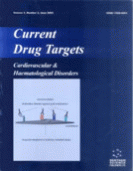Abstract
Antiplatelet therapy significantly reduces the incidence of vascular death, nonfatal myocardial infarction, and nonfatal stroke in patients with peripheral arterial disease (PAD) and intermittent claudication, in patients undergoing peripheral grafting, in patients undergoing peripheral angioplasty, and in patients with carotid disease. Aspirin, aspirin plus dipyridamole, ticlodipine, and clopidogrel have been shown to be efficacious in the treatment of PAD. Data from the Clopidogrel versus Aspirin in Patients at Risk for Ischaemic Events (CAPRIE) trial demonstrated in 11,592 patients with PAD that patients randomized to clopidogrel 75 mg daily had a 24% significant (p=0.0028) reduction in vascular death, nonfatal myocardial infarction, and nonfatal stroke than patients randomized to aspirin 325 mg daily. These data favor the use of clopidogrel in patients with PAD.
Keywords: peripheral arterial disease, aspirin, clopidogrel, ticlodipine, dipyridamole
 2
2













